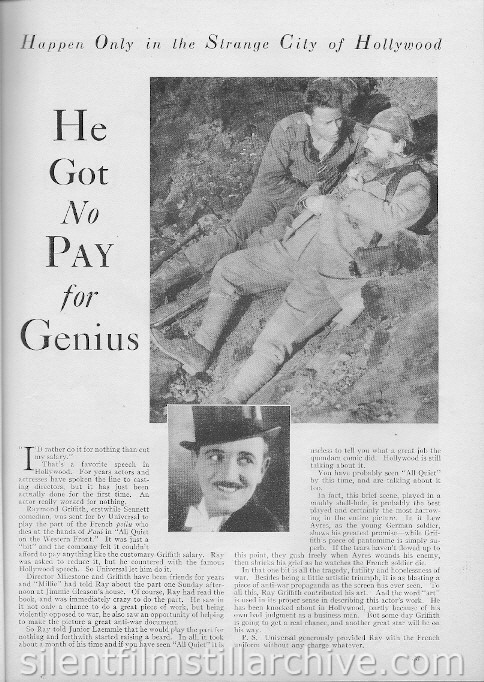![]()

He Got No Pay For Genius

He Got No Pay for Genius
"I'd rather do it for nothing than cut my salary."
That's a favorite speech in Hollywood. For years actors and actresses have spoken the line to casting directors, but it has just been actually done for the first time. An actor really worked for nothing.
Raymond Griffith, erstwhile Sennett comedian, was sent for by Universal to play the part of the French poilu who dies at the hands of Paul in "All Quiet on the Western Front." It was just a "bit" and the company felt it couldn't afford to pay anything like the customary Griffith salary. Ray was asked to reduce it, but he countered with the famous Hollywood speech. So Universal let him do it.
Director Milestone and Griffith have been friends for years and "Mille" had told Ray about the part one Sunday afternoon at Jimmie Gleason's house. Of course, Ray had read the book, and was immediately crazy to do the part. he saw in it not only a chance to do a great piece of work, but being violently opposed to war, he also saw an opportunity of helping to make the picture a great anti-war document.
So Ray told Junior Laemmle that he would play the part for nothing and forthwith started raising a beard. In all, it took about a month of his time and if you have seen "All Quiet" it is useless to tell you what a great job the quondam comic did. Hollywood is still talking about it.
You have probably seen "All Quiet" by this time, and are talking about it too.
In fact, this brief scene, played in a muddy shell-hole, is probably the best played and certainly the most harrowing in the entire picture. In it Lew Ayres, as the young German soldier, shows his greatest promise -- while Griffith's piece of pantomime is simply superb. If the tears haven't flowed up to this point, they gush freely when ayres wounds his enemy, then shrieks his grief as he watches the French soldier die.
In that one bit is all the tragedy, futility and hopelessness of war. Besides being a little artistic triumph, it is as blasting a piece of anti-war propaganda as the screen has ever seen. To all this, Ray Griffith contributed his art. And the word "art" is used in its proper sense in describing this actor's work. he has been knocked about in Hollywood, partly because of his own bad judgement as a business man. But some day Griffith is going to get a real chance, and another great star will be on his way.
P.S. Universal generously provided Ray with the French uniform without any charge whatever.
-- Photoplay magazine, July 1930, page 33
Photos from All Quiet on the Western Front (1930)
Last Modified February 12, 2012














